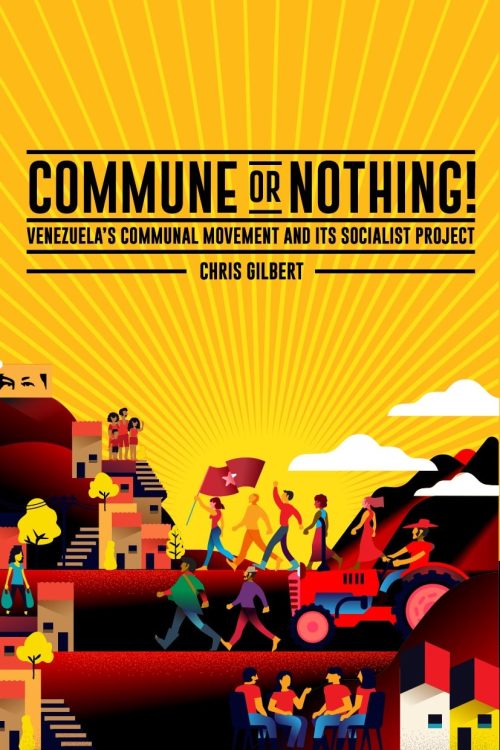Commune or Nothing! Venezuela’s Communal Movement and its Socialist Project
by Chris Gilbert
208 pages / $23 / 978-1-68590-023-6
Reviewed by Ron Jacobs for Counterpunch
About midway through his new book Commune or Nothing: Venezuala’s Communal Movement and its Socialist Project, author Chris Gilbert introduces the reader to Marxist theoretician István Mészáros and his groundbreaking book titled Beyond Capital: Toward a Theory of Transition. Gilbert does so in the context of a discussion about the commune movement in Venezuela. The text, which was published in the year 2000, closely examines the nature of socialism in the wake of the collapse of the Soviet Union and the turn towards capitalism in China. The essence of Mészáros’ analysis is that it is capital, not capitalism that must be removed from the world economy in order for a sustainable and just world to come into being. His thesis bases itself in part on the idea that the system of capital and its “hierarchical and anti-democratic metabolism and its extraction of surplus value” (Gilbert, 86) continued to dominate the economies of the supposedly socialist societies of the USSR, China and other nations. While not capitalist in the same sense as the US and other overtly capitalist economies, the structure of these socialist nations was based on the same essential principles as those nations, only without private ownership. Mészáros’ solution is simple: more socialism is needed, not less. In other words, the workers must truly control the means of production.
Venezuela’s Bolivarian revolutionary leader Hugo Chavez not only agreed with the ideas in Beyond Capital, his government spent a fair amount of his time while he was president of Venezuela experimenting with the concepts in the text. As Gilbert explains in Commune or Nothing!, the first manifestation of this appeared in the cooperatives that were created in Venezuela beginning in 2003. After a few years, the Chavez and his advisers concluded that cooperatives, while they featured collective ownership, they remained private property. Consequently, their role in creating a democratic and ultimately just society was limited, if for no other reason than that they had to compete in the marketplace and were ultimately subject to the pressures of an economy that demanded competition and profits, no matter how small. One of Chavez’s final major acts was his call for a communal society, a society that differed from cooperatives in that the communes would produce according to the community’s needs not for profit or a share of the market. After all, goes the reasoning, since the communal endeavor was of, by and for the community, each commune would produce what the community decided it needed and desired. This common goal would be the driving force behind production and would eliminate the redundancy endemic in capitalism; a redundancy caused by capital’s dependency on profit. In fact, the title of Gilbert’s book is taken from Chavez’s line in the speech: “Comuna o nada!”
Gilbert is a professor of political studies at the Universidad Bolivariana de Venezuela in Venezuela’s capitol city Caracas. He is also a co-host of the television program Escuela de Cuadros. His residency in the country and involvement in its community politics provides him with an on-the-ground perspective and understanding of the political movements and struggles within the country and its various constituencies. When I met up with him for coffee in 2023, it was clear I was talking with a true friend of the Bolivarian revolution and a Marxist. His writing reflects that understanding. In other words, not only does his narrative come from the grassroots and tell the story of the Venezuelans trying to move their country into a future where economic and social justice is the nation’s foundation, it also furnishes the reader with a Marxist critique of those efforts. In this instance, that means an in depth critique of the problems with the communal endeavor and a situating of it within the Marxist model.
When all is said and done, Commune or Nothing! succeeds in its exploration and explication of the commune movement in Venezuela. Gilbert details visits to various communal experiments, discussing their origins, introducing the reader to individuals working there, and discussing each communes successes, difficulties and hopes. The anecdotes are as essential to his telling as is the analysis. They also provide the reader with real-life examples of the issues involved in the process described. Reading this book, convinced me that the way forward is to (as Gilbert writes early on in the text) “put the commune back into communism.” Those of us who are interested in turning back the current planetary trends of super-exploitation, war and the privatization of public space, goods and services should certainly look to the movement considered here. In writing this book, Chris Gilbert has given the worldwide left a ray of hope. The trick now is to act upon it.


Comments are closed.